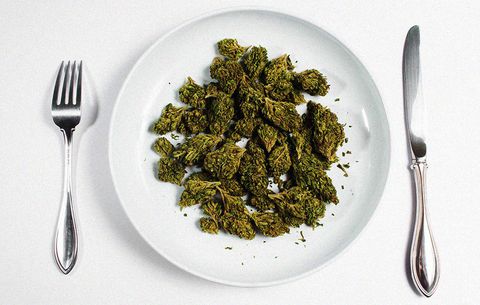How does cannabis work as an appetite suppressant?

Researchers believe that cannabis may prove useful for treating various medical conditions and addictive habits, including overeating. Although the evidence is scarce, information exists to suggest the potential of extracting the plant’s non-psychoactive cannabinoid CBD (cannabidiol) to help shed the pounds and curbe binge eating.
While FDA-approved appetite suppressants, such as phentermine-topiramate (Qsymia), naltrexone-bupropion (Contrave) and liraglutide (Saxenda) can prove effective, the unwanted side effects – e.g. irregular heartbeat/palpitations, difficulty sleeping and fidgetiness – are not so desirable.
This is where cannabis for weight loss comes in. Plant-derived treatments are fast emerging as popular appetite suppressants, thanks to their non-addictive qualities and the fact that they are sourced directly from nature. With that being said, let’s find out how cannabis may harbor potential for maintaining weight.
What causes obesity?
Obesity is a lingering problem across the United States, not to mention the rest of the world. Someone whose Body Mass Index (BMI) exceeds the standard measurement for their height will likely be one of the two billion people who are categorized as clinically obese around the world. More specifically, an individual will be classed as “obese” if his or her bodyweight is 20 percent more than it should be.
Listed below are some factors that may influence a person’s chances of becoming dangerously overweight:
- Genetics
Just like everyone’s genetics can affect the way he or she feels after consuming cannabis, this unique biochemistry can also play an important role in a person’s weight. For example, someone with an overweight mother or father is more likely to experience weight problems, since obesity is usually caused by a genetic deficiency.
- Poor Sleep Patterns
Are you getting your recommended eight hours of sleep per night? If not, researchers say that you could be clinging onto more weight than you would if you were restless. In fact, a study carried out by a team at the Warwick Medical School at the University of Warwick discovered that obesity risks almost doubled when a patient was sleep deprived. The reason for this was an appetite-boosting hormone called Ghrelin is released in increased amounts when the body craves rest.
- Lack of Physical Activity
Doctors recommend that everyday people get at least 75-150 minutes of exercise on a weekly basis. Even if you aren’t a fan of high-intensity workouts, there are plenty of ways to increase your body’s calorie-burning efficacy with low-intensity exercises that you can introduce into your daily routine. Not only will exercise speed up your metabolism but also, it could boost brain power and critical thinking processes.
- Certain Types of Medication
You may be surprised to discover that specific over-the-counter (OTC) medications can actually prevent you from shedding the pounds. For example, medicines for diabetes – such as thiazolidinediones, insulin and sulfonylureas – as well as antidepressant medicines – including amitriptyline, paroxetine and sertraline – may contribute to weight gain.
How can cannabis help curb obesity?
While research is limited, scientists believe that high-CBD strains could be the way to go when using cannabis for weight loss. ‘CBD’ is short for ‘cannabidiol’ and this non-psychotropic cannabinoid will constitute a $9.69 billion global market by 2025. THC (tetrahydrocannabinol), however, is a psychotropic cannabinoid that may increase appetite.
Since THC reacts with CB1 receptors inside the body’s endocannabinoid system (ECS), nutritionists advise overweight individuals to steer clear of this cannabinoid and instead, choose a strain high in CBD. Why? Because CBD has the ability to indirectly react with CB2 receptors – which are mostly found in the nervous system and immune system – all the while counteracting the mechanisms of hunger-triggering CB1 receptors. This means that a low-THC, high-CBD strain could be worthwhile if you’re considering cannabis as an appetite suppressant.
Furthermore, scientists have discovered that THCV (tetrahydrocannabivarin) may also ease hunger pangs. Although THCV interacts with the same receptors as THC, this cannabinoid is an antagonist of CB1 and CB2 receptors; therefore its reaction with the human body is opposite that of THC. When consumed – whether THCV is ingested or inhaled – the cannabis-derived chemical could obstruct the pathways inside the brain that cause a person to experience pleasure from food.
Cannabis for weight loss: Strain choices that could suppress appetite
High-CBD, low-THC strains like ACDC, Charlotte’s Web, Ringo’s Gift, Harle-Tsu and Harlequin are worth trying. Alternatively, you may choose high-THCV strains, such as Durban Poison, Doug’s Varin, Jack the Ripper or Pineapple Purps.
Final word: Whatever strain you choose when using cannabis for weight loss, always consult with your doctor or a licensed healthcare practitioner first. Start low and go slow to find a cannabinoid composition that suits you personally.







